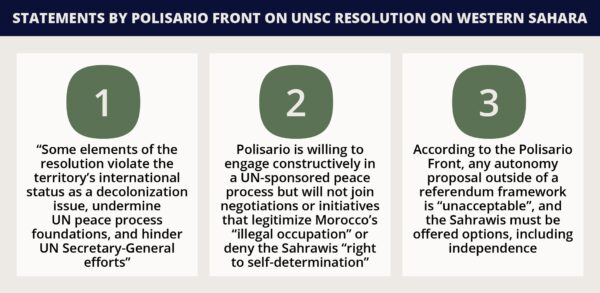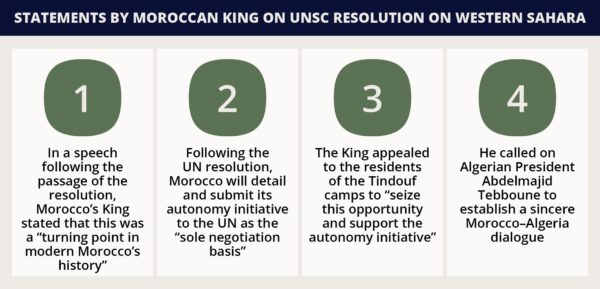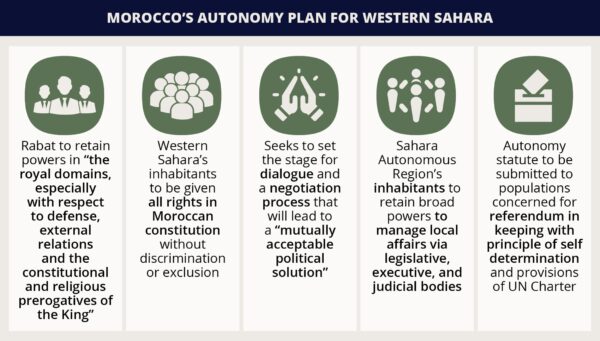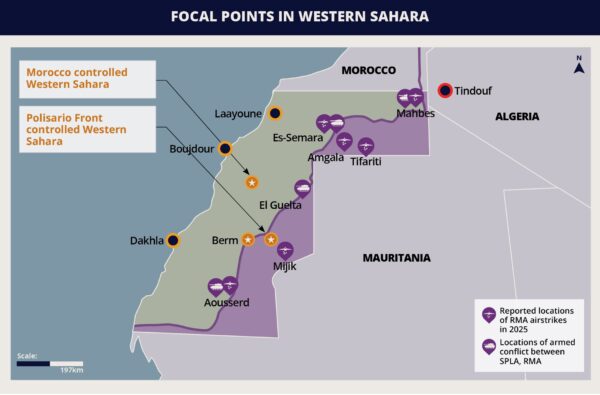Morocco Analysis: UNSC adopts resolution on October 31 naming Morocco’s Autonomy Proposal as basis for Western Sahara talks; challenges to negotiations to persist
Executive Summary
- On October 31, the UN Security Council (UNSC) adopted Resolution 2797 expressing “full support” for the UN in “facilitating and conducting negotiations based on Morocco’s Autonomy Proposal” to achieve a resolution to the Western Sahara dispute.
- The decision reflects a broader trend among Western states toward a more pro-Moroccan position, a shift that accelerated after the US’ 2020 recognition of Morocco’s sovereignty over Western Sahara.
- This recognition indirectly undermines the Polisario Front’s longstanding demand for a UN-supervised referendum on independence.
- Despite the resolution’s passage, the core disagreement over whether a referendum should occur and what options it should include remains unresolved. This is likely to hinder meaningful negotiations in the coming months.
Current Situation
- On October 31, the UNSC passed a proposal expressing “full support” for the UN in “facilitating and conducting negotiations based on Morocco’s Autonomy Proposal with a view to achieving a just, lasting, and mutually acceptable resolution to the Western Sahara dispute.” The resolution garnered 11 votes in favor and three abstentions. Algeria did not participate in the vote.
- The resolution also called upon the parties to “engage in these discussions without preconditions, taking as basis Morocco’s Autonomy Proposal, with a view to achieving a final and mutually acceptable political solution that provides for the self-determination of the people of Western Sahara, recognizes that genuine autonomy could represent a most feasible outcome”.
- The vote also extended the mandate of the UN Mission for a Referendum in Western Sahara (MINURSO) for one more year.
- Following the vote, the US representative to the UN stated that Washington believed that “regional peace is possible this year,” and that the US would “make every effort to facilitate progress towards this goal.”
- According to reports from October 23, the Polisario Front’s Foreign Minister, Mohamed Yeslem Beissat stated that the group had presented the UN with an extended proposal which “includes three options provided for by international law: independence, integration, and a free association pact, which could resemble what Morocco proposes.” Beissat further stated that “discussing the autonomy proposal outside the framework of a referendum is not conceivable and cannot be accepted.
- On November 16, Algeria’s Foreign Minister stated that Algiers would “not hesitate to offer its support to any mediation initiative between the two parties to the conflict, provided that this initiative falls within the UN framework, and that it adheres, in its form and content, to the principles of a just, lasting, and final solution to the Western Sahara issue”.
Assessments
The adoption of this UNSC Resolution reinforces a broader and accelerating shift in Western countries’ approach to the Western Sahara dispute. Since the US formally recognized Morocco’s sovereignty over the territory in 2020, successive European governments, such as France, Spain, and the UK, have gradually realigned their policies toward a more pro-Moroccan stance, likely driven by the prioritization of migration management, and security cooperation. By explicitly describing Morocco’s Autonomy Proposal as the “most feasible” solution, the new resolution effectively sets the proposal as the baseline framework for any future political process. This reflects a shift in the framing of the Western Sahara issue, from the long-standing question of decolonization as put forward by the Polisario Front, which controls 20-25 percent of the territory, to a focus on integrating the territory within Moroccan sovereignty.
Principal disputes between Rabat, Polisario Front
- The main point of contention is Morocco’s Autonomy Proposal, first presented to the UN in 2007 and now reinforced by Resolution 2797 as the preferred path to a settlement. Under this framework, Morocco would maintain control over key aspects of sovereignty, including the national flag and anthem, currency, foreign affairs, defense, territorial integrity, and the judicial system. Meanwhile, a Sahara Autonomous Region would oversee local governance, matters such as policing, budgeting and taxation, education, economic and social policy, and infrastructure development.
- Recognizing this proposal, and by extension Morocco’s sovereignty, effectively sidelines the Polisario Front’s long-standing demand for a UN-supervised referendum on self-determination, which was the cornerstone of the 1991 UN Settlement Plan. That plan created the UN Mission for a Referendum in Western Sahara (MINURSO) to organize a vote allowing Sahrawis to choose between independence and integration with Morocco. This process, however, was hurdled by disputes over voter eligibility ultimately leading to its collapse in 1996. Morocco was perceived by the Polisario Front as seeking to expand the electorate by including tens of thousands of applicants it claimed had tribal ties to the territory, a move widely seen as an attempt to tip the vote in its favor. The Polisario Front, by contrast, insisted that only those listed in the 1975 Spanish census should qualify. Overall, this dispute over voter eligibility remains unresolved and is likely to persist.
- In the run up to the October 31 UNSC vote, the Polisario Front seemingly showed a limited willingness to compromise, expressing openness to including Morocco’s autonomy plan as one option in a future vote, alongside independence. While this signals some flexibility toward Morocco’s framework, the Polisario remains firm that any final settlement must be based on a free and fair vote, rather than unilateral recognition of Moroccan sovereignty. As a result, both these core disagreements over a referendum persists and will continue to represent a major obstacle for any future negotiations.
Economic, diplomatic implications
- Diplomatically, the passage of Resolution 2797 represents a significant victory for Morocco. It strengthens Rabat’s international legitimacy and validates its long-standing strategy of using bilateral partnerships to build support for its autonomy plan. The resolution also reinforces the growing international alignment with Morocco’s position. According to reports, more than 100 UN member states now back the autonomy proposal, and over 30 Arab, Asian, and African countries have already opened consulates in Laayoune and Dakhla. This has come at the expense of support for the Polisario Front, with the number of countries that officially recognize the Polisario’s proclaimed Sahrawi Arab Democratic Republic (SADR) having fallen from 84 at its peak, to 47 as of November 2024. Overall, the resolution underscores growing international convergence around Morocco’s proposal, particularly among Western powers seeking regional stability and cooperation on migration and security.
- For Algeria, which hosts and finances the Polisario leadership in Tindouf, the outcome constitutes a strategic and diplomatic setback. Algiers views Western support for Morocco as part of a broader effort to limit its regional influence and elevate Rabat as a preferred partner. While a direct confrontation with Morocco remains unlikely, Algeria is likely to intensify its diplomatic outreach within the African Union (AU), Asia and other multilateral organizations in an effort to counterbalance the emerging Western consensus and reaffirm its support for Sahrawi self-determination.
- The economic attractiveness of Western Sahara is also a major factor in Morocco’s interest in retaining its autonomy over the territory. Morocco and Western Sahara together hold the largest phosphate reserves in the world, with the Bou Craa mine in Western Sahara serving as one of the key sites underpinning this resource base and contributing around ten percent of Morocco’s phosphate production. Reports also indicate that coastal and artisanal fish catches in waters off Morocco-controlled Western Sahara accounted for approximately 72 percent of the total coastal and artisanal fishing volume for all of Morocco as of 2022.
- Thus, the passage of the latest resolution is likely to encourage Morocco to expand investment and development initiatives in Western Sahara, with the aim of further capitalizing on these economic assets. This trend will be supported by the perception of growing international acceptance of its autonomy plan, which is significant because foreign companies have long faced legal and reputational risks when operating in the territory. Under the EU–Morocco Association Agreement, for instance, trade and resource deals involving Western Sahara have repeatedly faced legal challenges, and the Court of Justice of the EU ruled in 2016 and again in 2024 that such agreements cannot apply without the consent of the Sahrawi people.
- While these legal constraints will continue to influence foreign engagement, Resolution 2797 may gradually ease some barriers by signaling greater political and legal normalization of Morocco’s administration over the region. This could reduce operational uncertainty and encourage investment in sectors central to Morocco’s long-term economic strategy, including renewable energy, hydrocarbons, agriculture and, critically, phosphates, although reputational and legal risks, particularly from NGOs and Sahrawi advocacy groups, will remain.
Forecast
Core dispute will persist despite Rabat’s diplomatic gains
- In the coming months, the US is likely to intensify efforts to broker a final agreement between Morocco and the Polisario Front, leveraging the momentum of Resolution 2797. President Donald Trump, who seeks to be perceived as a key mediator and peacemaker, may push for talks to formalize an autonomy-based settlement under UN supervision. In this vein, and based on previous calls within the US to designate the Polisario as a terrorist group, including in April, Washington may also threaten to advance terrorist-designation legislation if the Polisario resists engagement, using this as leverage to pressure the group into compliance with the negotiation process.
- However, fundamental divisions remain. The Polisario Front and Algeria have rejected Resolution 2797, seeing it as legitimizing annexation and undermining international law. Morocco continues to oppose a referendum that includes independence, which remains the core obstacle. The Polisario, meanwhile, insists on such a vote, although now with autonomy included as an option.
- Additionally, an effective conflict resolution cannot happen without Algeria’s involvement. As the Polisario Front’s primary backer and a key regional power, Algiers heavily influences both the political and security dimensions of the conflict. Since cutting ties with Morocco in 2021, Algeria has maintained a hardline stance, supporting the Polisario politically and historically providing logistical assistance. While recent US statements, such as US Special Envoy Steve Witkoff’s remark in October that his team was working on a Morocco-Algeria deal he hoped to finalize within 60 days, point to potential openings, Algeria remains wary of any settlement that could increase Morocco’s regional influence. At the same time, economic modernization, and continued Western engagement on energy and security may create incentives for Algiers to engage, but only if negotiations offer concrete benefits in energy, infrastructure, and security.
Marked escalation in armed conflict unlikely
- From a security perspective and based on developments observed since the breakdown of the 1991 ceasefire in November 2020, a major escalation between the two sides as a result of the recent UNSC resolution is unlikely. Over the last five years, the Sahrawi People’s Liberation Army (SPLA), the armed wing of the Polisario Front, has claimed frequent attacks against the Royal Moroccan Army (RMA) in areas near the Berm, the security barrier that divides Morocco-administered Western Sahara and Polisario-administered areas. Since October 31, the SPLA has continued to report attacks of this nature along the Berm. This pattern is likely to persist, with sporadic skirmishes along the barrier and UAV strikes by the RMA targeting SPLA and Polisario members in Western Sahara expected to continue.
- The Polisario Front’s limited operational capabilities, combined with Algeria’s current unwillingness to engage in direct confrontation and the group’s failure to act on previous threats against Morocco or foreign businesses in Western Sahara, suggest it is not in a position to substantially escalate the conflict. This is evidenced by the fact that even following the breakdown of the ceasefire in 2020, the Polisario Front has not been able to impose a significant cost on Morocco capable of disrupting Rabat’s plans.
- A sustained military campaign would also carry the risk of further undermining the Polisario’s international legitimacy, enabling Morocco to frame its operations as counterterrorism and pushing Western states closer to Rabat. In this context, any escalation by the Polisario Front is likely to remain limited in scope and may at most take the form of strikes on RMA positions located further from the Berm, deeper in Morocco-controlled Western Sahara, rather than targeting civilians or businesses. Overall, the group’s capacity to exert meaningful pressure on Morocco is likely to remain constrained, resulting in continued low intensity fighting along the Berm.
Recommendations
- Travel to Rabat, Casablanca, and Marrakech may continue while adhering to security precautions regarding civil unrest and militancy. Contact us at [email protected] or +44 20-3540-0434 for itinerary support options.
- Avoid all travel to areas along the “Berm” barrier separating Morocco and Polisario Front-controlled territory in Western Sahara. This is due to reported hostilities between the Polisario Front’s military wing, the Sahrawi People’s Liberation Front (SPLA), and the Royal Moroccan Army (RMA).
- Conduct specific and timely risk assessments before traveling to Western Sahara’s coastal areas.
- Avoid discussing sensitive topics, including the Western Sahara issue, to avoid attracting unwanted attention and possible detention as this could be perceived as anti-government discourse. This applies to both public spaces and social media platforms.
Executive Summary
- On October 31, the UN Security Council (UNSC) adopted Resolution 2797 expressing “full support” for the UN in “facilitating and conducting negotiations based on Morocco’s Autonomy Proposal” to achieve a resolution to the Western Sahara dispute.
- The decision reflects a broader trend among Western states toward a more pro-Moroccan position, a shift that accelerated after the US’ 2020 recognition of Morocco’s sovereignty over Western Sahara.
- This recognition indirectly undermines the Polisario Front’s longstanding demand for a UN-supervised referendum on independence.
- Despite the resolution’s passage, the core disagreement over whether a referendum should occur and what options it should include remains unresolved. This is likely to hinder meaningful negotiations in the coming months.
Current Situation
- On October 31, the UNSC passed a proposal expressing “full support” for the UN in “facilitating and conducting negotiations based on Morocco’s Autonomy Proposal with a view to achieving a just, lasting, and mutually acceptable resolution to the Western Sahara dispute.” The resolution garnered 11 votes in favor and three abstentions. Algeria did not participate in the vote.
- The resolution also called upon the parties to “engage in these discussions without preconditions, taking as basis Morocco’s Autonomy Proposal, with a view to achieving a final and mutually acceptable political solution that provides for the self-determination of the people of Western Sahara, recognizes that genuine autonomy could represent a most feasible outcome”.
- The vote also extended the mandate of the UN Mission for a Referendum in Western Sahara (MINURSO) for one more year.
- Following the vote, the US representative to the UN stated that Washington believed that “regional peace is possible this year,” and that the US would “make every effort to facilitate progress towards this goal.”
- According to reports from October 23, the Polisario Front’s Foreign Minister, Mohamed Yeslem Beissat stated that the group had presented the UN with an extended proposal which “includes three options provided for by international law: independence, integration, and a free association pact, which could resemble what Morocco proposes.” Beissat further stated that “discussing the autonomy proposal outside the framework of a referendum is not conceivable and cannot be accepted.
- On November 16, Algeria’s Foreign Minister stated that Algiers would “not hesitate to offer its support to any mediation initiative between the two parties to the conflict, provided that this initiative falls within the UN framework, and that it adheres, in its form and content, to the principles of a just, lasting, and final solution to the Western Sahara issue”.
Assessments
The adoption of this UNSC Resolution reinforces a broader and accelerating shift in Western countries’ approach to the Western Sahara dispute. Since the US formally recognized Morocco’s sovereignty over the territory in 2020, successive European governments, such as France, Spain, and the UK, have gradually realigned their policies toward a more pro-Moroccan stance, likely driven by the prioritization of migration management, and security cooperation. By explicitly describing Morocco’s Autonomy Proposal as the “most feasible” solution, the new resolution effectively sets the proposal as the baseline framework for any future political process. This reflects a shift in the framing of the Western Sahara issue, from the long-standing question of decolonization as put forward by the Polisario Front, which controls 20-25 percent of the territory, to a focus on integrating the territory within Moroccan sovereignty.
Principal disputes between Rabat, Polisario Front
- The main point of contention is Morocco’s Autonomy Proposal, first presented to the UN in 2007 and now reinforced by Resolution 2797 as the preferred path to a settlement. Under this framework, Morocco would maintain control over key aspects of sovereignty, including the national flag and anthem, currency, foreign affairs, defense, territorial integrity, and the judicial system. Meanwhile, a Sahara Autonomous Region would oversee local governance, matters such as policing, budgeting and taxation, education, economic and social policy, and infrastructure development.
- Recognizing this proposal, and by extension Morocco’s sovereignty, effectively sidelines the Polisario Front’s long-standing demand for a UN-supervised referendum on self-determination, which was the cornerstone of the 1991 UN Settlement Plan. That plan created the UN Mission for a Referendum in Western Sahara (MINURSO) to organize a vote allowing Sahrawis to choose between independence and integration with Morocco. This process, however, was hurdled by disputes over voter eligibility ultimately leading to its collapse in 1996. Morocco was perceived by the Polisario Front as seeking to expand the electorate by including tens of thousands of applicants it claimed had tribal ties to the territory, a move widely seen as an attempt to tip the vote in its favor. The Polisario Front, by contrast, insisted that only those listed in the 1975 Spanish census should qualify. Overall, this dispute over voter eligibility remains unresolved and is likely to persist.
- In the run up to the October 31 UNSC vote, the Polisario Front seemingly showed a limited willingness to compromise, expressing openness to including Morocco’s autonomy plan as one option in a future vote, alongside independence. While this signals some flexibility toward Morocco’s framework, the Polisario remains firm that any final settlement must be based on a free and fair vote, rather than unilateral recognition of Moroccan sovereignty. As a result, both these core disagreements over a referendum persists and will continue to represent a major obstacle for any future negotiations.
Economic, diplomatic implications
- Diplomatically, the passage of Resolution 2797 represents a significant victory for Morocco. It strengthens Rabat’s international legitimacy and validates its long-standing strategy of using bilateral partnerships to build support for its autonomy plan. The resolution also reinforces the growing international alignment with Morocco’s position. According to reports, more than 100 UN member states now back the autonomy proposal, and over 30 Arab, Asian, and African countries have already opened consulates in Laayoune and Dakhla. This has come at the expense of support for the Polisario Front, with the number of countries that officially recognize the Polisario’s proclaimed Sahrawi Arab Democratic Republic (SADR) having fallen from 84 at its peak, to 47 as of November 2024. Overall, the resolution underscores growing international convergence around Morocco’s proposal, particularly among Western powers seeking regional stability and cooperation on migration and security.
- For Algeria, which hosts and finances the Polisario leadership in Tindouf, the outcome constitutes a strategic and diplomatic setback. Algiers views Western support for Morocco as part of a broader effort to limit its regional influence and elevate Rabat as a preferred partner. While a direct confrontation with Morocco remains unlikely, Algeria is likely to intensify its diplomatic outreach within the African Union (AU), Asia and other multilateral organizations in an effort to counterbalance the emerging Western consensus and reaffirm its support for Sahrawi self-determination.
- The economic attractiveness of Western Sahara is also a major factor in Morocco’s interest in retaining its autonomy over the territory. Morocco and Western Sahara together hold the largest phosphate reserves in the world, with the Bou Craa mine in Western Sahara serving as one of the key sites underpinning this resource base and contributing around ten percent of Morocco’s phosphate production. Reports also indicate that coastal and artisanal fish catches in waters off Morocco-controlled Western Sahara accounted for approximately 72 percent of the total coastal and artisanal fishing volume for all of Morocco as of 2022.
- Thus, the passage of the latest resolution is likely to encourage Morocco to expand investment and development initiatives in Western Sahara, with the aim of further capitalizing on these economic assets. This trend will be supported by the perception of growing international acceptance of its autonomy plan, which is significant because foreign companies have long faced legal and reputational risks when operating in the territory. Under the EU–Morocco Association Agreement, for instance, trade and resource deals involving Western Sahara have repeatedly faced legal challenges, and the Court of Justice of the EU ruled in 2016 and again in 2024 that such agreements cannot apply without the consent of the Sahrawi people.
- While these legal constraints will continue to influence foreign engagement, Resolution 2797 may gradually ease some barriers by signaling greater political and legal normalization of Morocco’s administration over the region. This could reduce operational uncertainty and encourage investment in sectors central to Morocco’s long-term economic strategy, including renewable energy, hydrocarbons, agriculture and, critically, phosphates, although reputational and legal risks, particularly from NGOs and Sahrawi advocacy groups, will remain.
Forecast
Core dispute will persist despite Rabat’s diplomatic gains
- In the coming months, the US is likely to intensify efforts to broker a final agreement between Morocco and the Polisario Front, leveraging the momentum of Resolution 2797. President Donald Trump, who seeks to be perceived as a key mediator and peacemaker, may push for talks to formalize an autonomy-based settlement under UN supervision. In this vein, and based on previous calls within the US to designate the Polisario as a terrorist group, including in April, Washington may also threaten to advance terrorist-designation legislation if the Polisario resists engagement, using this as leverage to pressure the group into compliance with the negotiation process.
- However, fundamental divisions remain. The Polisario Front and Algeria have rejected Resolution 2797, seeing it as legitimizing annexation and undermining international law. Morocco continues to oppose a referendum that includes independence, which remains the core obstacle. The Polisario, meanwhile, insists on such a vote, although now with autonomy included as an option.
- Additionally, an effective conflict resolution cannot happen without Algeria’s involvement. As the Polisario Front’s primary backer and a key regional power, Algiers heavily influences both the political and security dimensions of the conflict. Since cutting ties with Morocco in 2021, Algeria has maintained a hardline stance, supporting the Polisario politically and historically providing logistical assistance. While recent US statements, such as US Special Envoy Steve Witkoff’s remark in October that his team was working on a Morocco-Algeria deal he hoped to finalize within 60 days, point to potential openings, Algeria remains wary of any settlement that could increase Morocco’s regional influence. At the same time, economic modernization, and continued Western engagement on energy and security may create incentives for Algiers to engage, but only if negotiations offer concrete benefits in energy, infrastructure, and security.
Marked escalation in armed conflict unlikely
- From a security perspective and based on developments observed since the breakdown of the 1991 ceasefire in November 2020, a major escalation between the two sides as a result of the recent UNSC resolution is unlikely. Over the last five years, the Sahrawi People’s Liberation Army (SPLA), the armed wing of the Polisario Front, has claimed frequent attacks against the Royal Moroccan Army (RMA) in areas near the Berm, the security barrier that divides Morocco-administered Western Sahara and Polisario-administered areas. Since October 31, the SPLA has continued to report attacks of this nature along the Berm. This pattern is likely to persist, with sporadic skirmishes along the barrier and UAV strikes by the RMA targeting SPLA and Polisario members in Western Sahara expected to continue.
- The Polisario Front’s limited operational capabilities, combined with Algeria’s current unwillingness to engage in direct confrontation and the group’s failure to act on previous threats against Morocco or foreign businesses in Western Sahara, suggest it is not in a position to substantially escalate the conflict. This is evidenced by the fact that even following the breakdown of the ceasefire in 2020, the Polisario Front has not been able to impose a significant cost on Morocco capable of disrupting Rabat’s plans.
- A sustained military campaign would also carry the risk of further undermining the Polisario’s international legitimacy, enabling Morocco to frame its operations as counterterrorism and pushing Western states closer to Rabat. In this context, any escalation by the Polisario Front is likely to remain limited in scope and may at most take the form of strikes on RMA positions located further from the Berm, deeper in Morocco-controlled Western Sahara, rather than targeting civilians or businesses. Overall, the group’s capacity to exert meaningful pressure on Morocco is likely to remain constrained, resulting in continued low intensity fighting along the Berm.
Recommendations
- Travel to Rabat, Casablanca, and Marrakech may continue while adhering to security precautions regarding civil unrest and militancy. Contact us at [email protected] or +44 20-3540-0434 for itinerary support options.
- Avoid all travel to areas along the “Berm” barrier separating Morocco and Polisario Front-controlled territory in Western Sahara. This is due to reported hostilities between the Polisario Front’s military wing, the Sahrawi People’s Liberation Front (SPLA), and the Royal Moroccan Army (RMA).
- Conduct specific and timely risk assessments before traveling to Western Sahara’s coastal areas.
- Avoid discussing sensitive topics, including the Western Sahara issue, to avoid attracting unwanted attention and possible detention as this could be perceived as anti-government discourse. This applies to both public spaces and social media platforms.





